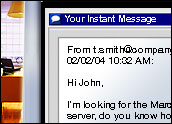With its release of the Google Search Appliance last year, the long-time leader of consumer Web search turned its attention to the needs of complex, data-intensive enterprises.

The search appliance — which includes hardware, software and support — interacts with an organization’s datacenter to search either an intranet or a business’ external Web site. Companies as diverse as Blue Cross/Blue Shield of Kansas, PBS, USA Today, the U.S. Army and Sun Microsystems already have adopted Google’s offering.
Dave Girouard, general manager for Google Enterprise, chatted recently with the E-Commerce Times about the Google Search Appliance, its target market, the vast opportunity within the enterprise search industry, and the environment at the Mountain View, California-based company’s headquarters.
E-Commerce Times: How would you describe the Google Search Appliance?
Dave Girouard: At a simple level, it’s a Google search engine in a box — a box that has the entire Google search engine built into it. You install [it] in your datacenter, turn it on and set a couple of configurations. Then it creates a Google search engine within your company for all the information, documents and Web pages throughout your corporate intranet. It’s also used broadly on public-facing sites for doing what we refer to as a site search.
ECT: What was the genesis of the Google Search Appliance?
It came about a couple of years ago because we had a lot of customers who said, “We really like using Google on the Web, and, gosh, we wish we had that same capability — that same kind of Google-quality search results on our intranet — because we find it’s harder to find things on our intranet than it is to find things on the entire Web, which seems kind of silly.”
ECT: What is your target market segment?
Girouard: I’d probably say it’s mostly of interest today to mid-size and up [organizations]. It’s hard to say exactly how big. For us, that might start at, I don’t know, 5,000 pages or above. There’s nothing specific about it. People know if they have a search problem. Generally, we sell the appliance to people who have as few as 5,000 Web pages and others that have more than 10 million. It really spreads the gamut there.
ECT: Has there been an across-the-board interest in this product, or has it appealed more to particular vertical markets?
Girouard: It really is across-the-board. It naturally follows where there’s a lot of information dissemination going on in companies. We have a lot of customers in pharmaceutical, technology, consumer goods, financial services, manufacturing, media companies. We sell a lot to the federal government. Anywhere they’re generating a lot of Web pages or content and need to help people get access to them, it’s a good fit.
ECT: How did the development of the Google Search Appliance evolve? Did you start out with an idea and end up with something that had greater functionality than you had originally envisioned?
Girouard: It was first designed around the idea of an intranet, to put inside somebody’s datacenter for content that’s inside their firewall, [but] in the last couple of years, we’ve found that we actually get just as many customers who use it to power search on their public-facing Web sites.
ECT: What kind of feedback are you getting from customers?
Girouard: There’s a fair amount you can see in quotes on our Web site. One of them — I don’t remember which one it is — said, “You know, we’ve been working on this search project with one of these other products for six months to try and get decent results. We got better search performance from your product within an hour.”
It really takes advantage of all the work done on the Google.com search engine and puts it in a box. The idea is you put it in the datacenter and set it up and, literally within an hour, you can have incredible search results. That’s what’s different about it.
The other thing I think is interesting — that’s kind of the IT perspective — is the user perspective. We hear a lot [from customers]: “We’ve had search on our site for a long time, and it doesn’t get used very much.” And usually that’s because the results aren’t that good or that reliable — people quit on it. And what we’ve heard several times is, when they put Google in, all of a sudden the number of queries goes through the roof. One guy said it literally doubled overnight.
ECT: Do you think a lot of that has to do with the Google name, the Google brand?
Girouard: I think it’s definitely a case where people know and trust Google and believe it will help them find what they need and want. So, all of a sudden, when they see it on their intranet, they say, “Oh my gosh, I think I will be able to find that sales presentation.”
The funny part is, it’s easier to find box scores from the 1957 World Series than it is to find last quarter’s sales presentation in the enterprise. While Web search has gotten really good, enterprise search has stagnated, and that’s why we really believe it’s a problem that needs to be solved and that Google has a unique set of capabilities to solve it.
ECT: What kinds of capabilities do you hope to add to this device in the future?
Girouard: One of the little pieces in our mission is organizing all the world’s information. The founders set fairly magnanimous goals for the company! We basically want to be able to search for anything [and] find anything that people might be looking for in the enterprise. So we’re looking to go deeper and wider than we are today.
The other thing I would say in general — we don’t like to pre-announce things — [is that] we’re developing so many fantastic things that you’ll see show up on Google.com or in our little lab section, and all of those are evaluated to see what really makes sense in the enterprise and in what form. What I think you can expect to see over time is we’re going to dip into the Google bag of goodies and develop products that make sense based on the core technology the company has.
ECT: You appear to have a good handle on your enterprise customers.
Girouard: Yes. One of the advantages we have in enterprise search is we have this consumer search business that gets over 200 million queries a day. So we’re constantly learning more about how people query, what sorts of mistakes they make, what results are good and what results are bad, and we’re also naturally tweaking the algorithms — that’s how Google search on the Web maintains its quality. All those tweaks and updates end up coming into the search appliance. So we benefit from all that work done on Google.com, and that’s why our search results are always so good.
ECT: It sounds like a great place to work, too. I like the idea that you encourage your engineers to spend one day a week following something that interests them.
Girouard: I view that as an appreciation — that we value the minds of the individuals. We think the greatest things happen when people are thinking on their own and being creative. That’s how a lot of the good things have happened at Google. Our founders really want to encourage people to continue at that pace of innovation and not get caught up in the more mundane things that you sometimes need to do in the course of your workdays.
ECT: In your mind, what is Google’s primary goal?
Girouard: You need to get products out. And in getting products out, there’s the glamorous part of it and then there’s the blood, sweat and tears part of it. The founders want to make sure we continue to innovate and really have that creative aspect that has brought Google as far as it’s come.
ECT: How, then, would you describe the atmosphere at Google?
Girouard: It’s an environment where people are really committed to improvement and to excellence. It’s a company that really likes to look at every part of how we do business and reengineer and do something new and different and better — from how we hire to how we treat employees to the products themselves. It’s really focused and intense in that way, but it’s also a company in the Silicon Valley tradition that likes to have fun and throws off some of the old business traditions, so to speak. But I wouldn’t mistake it for a company that isn’t real serious about its business and a company that isn’t really focused on improving its business.
ECT: How would you describe the state of the enterprise search industry today?
Girouard: Underserved. It’s a problem that’s been around for a while. There have been a bunch of companies trying to solve [this problem], but I still view it [in this way]: Search results are terrible, and there’s not a huge uptake in search.
You can put a search engine in your company, but you can’t force people to use it. It’s an industry that’s stumbled and bumbled along because the amount of pain involved to install, manage, update and monitor the solutions that are out there has not been equaled by the gain you get, which is obviously helping your employees or whomever get to the content.
We think we’re really changing that dynamic by dramatically lowering the amount of pain and the total cost of installing a solution, and really delivering search results that people are excited about and trust. It’s a market that has some work to do, and we’re here to do that.
ECT: When you’re meeting prospective clients, are they looking at this as a new app? To replace another developer’s solution? To replace something homegrown?
Girouard: It varies quite a bit. What I generally say is, there [are] a lot of people who have been using another vendor’s product that they find to be laborious, and, as I said, search results aren’t that great. We have customers that have had 10 or 15 IT employees entirely dedicated to search. Commonly, when they become Google customers, it’s a tiny fraction of one person’s time.
A lot of [companies] are using big, complex solutions that aren’t really working for them. Another bunch is using freeware or something they got free with their Web server or something like that, and it doesn’t really do what they want anymore. They’re getting a lot of complaints from people that they can’t find anything. And then there are people [who] have tried to create their own solutions.
It’s a well-known problem. It’s not like we have to evangelize enterprise Web search that much because it’s a pretty obvious need for people out there.
ECT: How do companies justify the cost of buying your device?
Girouard: People buy our product because our search results are better. Your employees are comfortable with [the results], which makes them happier clients. For the IT person, their customer is the employee. If it’s an e-business, then their client is the visitor to the Web site. We really speak to the benefits of the end user, which is really how Google got started.
The second part of the discussion is about how much easier and cost-effective this system is to deploy and manage. Those are the two key things.
We always talk about the fact that all this great search capability is in this box. You’re not getting a cheaper, separate little version of search from Google. This is the real thing.
ECT: How about pricing?
Girouard: It’s very competitive. It starts at $32,000, and for that what you get is the hardware, the software and two years of support. It goes higher based on the number of documents you have. We view it as very cost-competitive and a lot less expensive than what people are used to paying. When you look at the total cost of ownership, the difference [is] dramatic.
ECT: Do you sell the product directly or through resellers?
Girouard: We mostly sell directly.
ECT: And it is relatively simple to deploy?
Girouard: Yes. There are a lot of configurations you can do. You can exclude different parts of your site you don’t want to have in a search engine, or you can determine which parts get updated more quickly. You can customize the results so they look like your Web site. But you don’t have to do [that]. You can just turn it on and go.
ECT: So do you offer any kind of professional services to help clients tweak or customize the solution?
Girouard: It’s one of the beautiful things from the customer’s perspective: They’re used to buying something and getting this whole second thing, which is, “Here’s all the services you need to get” — which is double the price of the software. In our case, you get one number, which includes everything, even support.
[With] a lot of enterprise software, the price of the software can be maybe 25 percent of the overall price of the project. We think even compared to that 25 percent we look pretty good — but compared with 100 percent, we look great.
ECT: How frequently are you required to upgrade the device?
Girouard: We would like to be in the once- or twice-a-year range. That’s for major upgrades. We do software updates very regularly. They’re actually done automatically from the box. You don’t have to take a CD or anything. It can be updated in a hands-off fashion. It phones home, so to speak.
ECT: Where do you expect this market to be a year or so from now?
Girouard: Generally, it’s a problem that will never really be solved. There are always better results you can deliver. If you think about the enterprise, just [searching] on the intranet is one way of looking at it. But there are a lot of things [users are] looking for. We’re very dedicated to connecting people to information. You’ll see us broaden the types of information we can help people connect their employees to, and some of that will go well beyond the intranet. We’re just looking for hard search problems that need solving, and we’re going to apply ourselves to them.
ECT: I’m waiting for the psychic search!
Girouard: That’s what our founders consider the ideal search engine: It reads your mind, and it knows what you’re thinking, and it brings back exactly what you’re looking for and nothing else. Until we do that, we think there’s more work to be done.

























































Social Media
See all Social Media